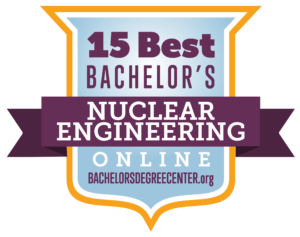
Key Information:
- Michigan Technology University and NC State University have two best online nuclear engineering bachelor’s degree programs.
- Online nuclear engineering programs offer flexibility, allowing students to balance studies with other commitments.
- Accredited programs ensure high-quality education, which is crucial for career advancement and professional recognition.
- Students can specialize in areas like nuclear power generation, radiation protection, and nuclear reactor design.
- Graduates can pursue roles in government agencies, private industry, research institutions, and healthcare facilities, with salaries ranging from $72,176 to $398,588 annually.
Nuclear engineering is about splitting or combining the nucleus of an atom to create energy. At present, it is among the most robust and efficient ways to create electrical power. As any nuclear engineer will tell you, nuclear power is controversial due to the hazardous nature of the waste product. However, as a nuclear engineer, you will have access to a field that is always looking for new talent. Those with the talent and the energy to obtain a nuclear engineering degree online, will not only gain access to high-paying entry-level jobs in the field, but they will also get their foot in the door in an ever-growing, ever vital industry.
This is good news for anyone with an interest in this field, but it gets better. Right now it’s easier than ever with more degree programs available for you to get an online nuclear engineering degree. The number of available courses is greater than ever. Many such programs are very affordable, and any nuclear engineering online degree will open the door to a dynamic and profitable career path. According to Payscale.com, the pay range for a nuclear engineer is $63,000 to $131,000 a year with an $87,000 median. Nuclear engineers also get profit-sharing options at most employers, which means you can make even more than what’s projected.
Methodology: Ranking the Best Nuclear Engineering Online Degree Programs
Bachelor’s Degree Center editors researched accredited, trusted colleges and universities for the best online nuclear engineering degree ranking. Programs are ranked by their cost, potential salary, and student satisfaction, using data from IPEDS and Niche.
1. Michigan Technology University

The online nuclear engineering degree at Michigan Technology University confers a BS in Electrical Engineering Technology. Michigan Tech partners with leaders in the industry to provide students with relevant coursework. Graduates of the nuclear engineering online degree go on to work at companies such as Ford, Harley-Davidson and the Mayo Clinic. This nuclear engineering degree online turns students into electrical engineering technologists who learn how things work from TVs to toasters. Graduates master the fundamentals of electrical power and finish with drafting, design and application skills. Students focus on computer engineering or industrial controls.
Founded in 1885, Michigan Technological University has 7,000 students and a long history. This public university has 120 programs including those in engineering, technology and health professions. A tradition of excellence combined with forward-thinking technology make the university an excellent choice for prospective students.
What We Like: Michigan Technology University’s long history brings academic excellence and tradition to a modern format in its online programs.
Degree: BS in Electrical Engineering Technology
Michigan Technology University BS in Electrical Engineering Technology
2. North Carolina State University

With North Carolina State University’s online nuclear engineering degree, students graduate with a degree in Electric Power Systems Engineering. This nuclear engineering online degree is designed for undergraduates who want to enter the engineering field. The program ends with an MS degree in Electrical Power Systems Engineering. Graduates learn the methods and tools needed to practice electrical engineering. With this nuclear engineering degree online, students learn skills and concepts that directly apply to the industry. Courses are taught by experienced professionals in this 30-credit hour program. This is a perfect opportunity for those looking to change careers.
NC State is a public university in the Raleigh area. There are more than 22,000 undergraduate students and admission competition to the college is fierce. Fewer than half of those who apply receive an acceptance letter but the university graduates 81% of its students. This is a phenomenal graduation rate when compared with institutions of similar size and helps the university rank highly.
What We Like: NC State is the #2 is ranked public university in North Carolina, making a degree from the university highly valued by prospective employers.
Degree: Electric Power Systems Engineering
North Carolina State University Electric Power Systems Engineering
3. University of Utah

Those seeking a nuclear engineering degree online, should consider the minor in nuclear engineering available at the University of Utah. This nuclear engineering online degree includes coursework in nuclear power as well as engineering. This is a great opportunity for students who want to learn about alternative energy sources. With this nuclear engineering degree online, students take part in the only undergraduate nuclear program in the state. Topics covered include radiochemistry, nuclear science, and neutron-based engineering.
Utah is a large institution with over 18,000 undergraduate students. The acceptance rate is 67%, and other majors include psychology, communications and economics. This competitive school has an excellent reputation.
What We Like: This is the top public school in Utah, making it a coveted degree that can lead to lucrative career opportunities for graduates.
Degree: Minor in Nuclear Engineering
University of Utah Minor in Nuclear Engineering
4. University of Arkansas

This online nuclear engineering program confers a BS in Electrical Engineering. Students study a broad range of topics including electronics, electromagnetism and the application of electricity. This nuclear engineering online degree includes the study of computer chips and integrated circuits, as well as electronic assemblies. Analog and mixed-signal circuit design, communications, digital circuit design, and embedded system design all factor into the curriculum of this nuclear engineering degree online.
Arkansas is a top school in the state and located in Fayetteville. It has more than 21,000 undergraduate students and a competitive admissions rate of 77%. Other majors include finance, marketing, and nursing.
What We Like: Arkansas is the #1 ranked public school in the state.
Degree: BS in Electrical Engineering
University of Arkansas BS in Electrical Engineering
5. University of South Carolina

The online nuclear engineering degree at the University of South Carolina is a convenient way for students to earn their degree online. In this nuclear engineering online degree, Students often come from other majors. Because this nuclear engineering degree online requires a thesis, it can be very challenging to pursue online. Students who want to achieve their MS in engineering after majoring in another subject can do so via this program.
South Carolina is located in the Columbia area and is a top ranked University. With over 25,000 undergraduate students, it offers a number of degree programs. The university accepts 63% of students who apply, and other popular majors include finance and business.
What We Like: South Carolina is the #2 in university in South Carolina.
Degree: BS to MS in Nuclear Engineering
University of South Carolina BS to MS in Nuclear Engineering
6. University of North Dakota

The University of North Dakota has an online nuclear engineering program that focuses on power. This nuclear engineering online degree leads to a rewarding profession or advanced coursework. With this nuclear engineering degree online, students can go on to receive excellent compensation working with public or private employers. Students benefit from a strong foundation in engineering and also study communications, entrepreneurship and continuous learning. The program focuses on both problem solving and technical skills.
At the University of North Dakota, students learn to save lives, build bridges and become teachers. Graduates include Fortune 500 executives and first responders. This is a great place to receive your degree in person or online.
What We Like: UND is the #2 ranked college in North Dakota.
Degree: BS in Electrical Engineering
University of North Dakota BS in Electrical Engineering
7. University of Alabama

The University of Alabama has an online nuclear engineering degree. The BS in mechanical engineering Give students the opportunity to study at home while earning their nuclear engineering online degree. With a nuclear engineering degree online, Students have classes that are identical to in-person courses. Graduates received the skills and confidence needed to Excel in a difficult career that has great rewards.
Alabama — Birmingham is a well-regarded public university with a large undergraduate enrollment of 10,000 students. Other popular majors include nursing, psychology, and business. The school has a generous acceptance rate of 92%.
What We Like: This is the #4 in top university in Alabama.
Degree: BS in mechanical engineering
University of Alabama BS in Mechanical Engineering
8. Bismarck State College

Students who earn their online nuclear engineering program at Bismarck State College prepare for careers in the nuclear power industry. This nuclear engineering online degree is ideal for those who come from an engineering or other academic background. Students in the nuclear engineering degree online gain the knowledge they need to become a non-licensed operator or work in the health physics department of nuclear generation agencies. This program also includes opportunities for nuclear station employees to get their degree or receive training.
Bismarck State has just 2,000 undergraduate students and accepts everyone who applies to the school. This gives many students an opportunity to study in majors such as electrical engineering and liberal arts.
What We Like: The school’s 100% acceptance and online format make education widely available for students.
Degree: AAS in Nuclear Power Technology
Bismarck State College AAS in Nuclear Power Technology
9. Old Dominion University

At Old Dominion University, students can earn an online nuclear engineering degree. With this nuclear engineering online degree, students study courses such as statistics, thermodynamics, computer-aided drafting, automation and controls and related topics. This nuclear engineering degree online includes a senior project in a student’s area of interest.
Old Dominion has 15,000 undergraduate students and accepts 87% of those who apply. Other majors at this popular university include criminology and psychology. This diverse offering, combined with a generous acceptance rate, opens doors for students who don’t perform well on standardized tests but want to earn their degree in a flexible online environment.
What We Like: 93% of students receive financial aid.
Degree: BS in Engineering Technology
Old Dominion University BS in Engineering Technology
10. Southern Illinois University Carbondale

Southern Illinois University Carbondale’s BS in Electrical Engineering Technology is a premier online nuclear engineering degree. This well-rounded nuclear engineering online degree provides students with a fundamental knowledge of engineering that can lead to career options or advanced studies. With a nuclear engineering degree online, graduates move on to careers in field service, electronic design, and sales. They also received training in high-demand courses such as communications and computer systems.
Southern Illinois Carbondale is a small public university that has just 8,000 undergraduate students. Seven out of 10 candidates who apply receive a letter of acceptance from the university. Other popular majors include accounting, education, and psychology. This university offers affordable education to students in a wide range of degree programs.
What We Like: Almost all students receive financial aid, making this an affordable option for those who wish to study online from the convenience of their home.
Degree: BS in Electrical Engineering Technology
Southern Illinois University Carbondale BS in Electrical Engineering Technology
11. National University

National University’s BS in Electrical and Computer Engineering is one of the best online nuclear engineering programs. A nuclear engineering online degree gives students a lot of flexibility for where and when they will take their courses. With this nuclear engineering degree online, students learn hardware and software skills associated with engineering. The curriculum focuses on the principles of traditional electrical engineering. Graduates will go on to careers operating computer-based devices that run much of the world.
National University — Bayamon is located in Puerto Rico. The small school has approximately 6,000 undergraduate students and a competitive acceptance rate of 57%. Other popular majors include law enforcement and pharmacy technician.
What We Like: 80% of students surveyed felt their professors put a lot of effort into courses. All students surveyed agreed that the workload is manageable.
Degree: BS in Electrical and Computer Engineering
National University BS in Electrical and Computer Engineering
12. Excelsior College

Excelsior College also has an online nuclear engineering program. Its BS in Nuclear Engineering Technology is accredited by ABET, making it a credentialed nuclear engineering online degree. With a nuclear engineering degree online, some students go on to careers in the U.S. Navy. courses include health physics, reactor operations, chemistry, and instrumentation in nuclear engineering. This degree often leads to lucrative salaries and positions of responsibility in private and public organizations.
Excelsior is a 100% online university with majors and nursing, business, and liberal arts. The school accepts all students who apply. Graduates go on to work in many different fields and students can choose from online or in-person classes.
What We Like: Eight out of ten students surveyed said it was easy to get the classes they needed. This is critical for students who have set a timeline for themselves and want to graduate on time.
Degree: BS in Nuclear Engineering Technology
Excelsior College BS in Nuclear Engineering Technology
13. Idaho State University

Idaho State University has a BAS in Energy Systems Nuclear Operations Technology. This online nuclear engineering program gives students a chance to have more control over their study schedules. Like most nuclear engineering online degree programs, this offers a lot of flexibility for those who have families or jobs. This nuclear engineering degree online focuses on work in nuclear power plants. Graduates of this program master the fundamentals of power generation, instrumentation, reactor plan operation, and safety protocols. Small class sizes give students plenty of access to instructors even in an online environment.
Idaho State in Pocatello, Idaho, has 6,000 undergraduate students. The admissions policy at the school is very generous and 100% of students who apply are accepted into the program. This gives students who didn’t make great grades in high school an opportunity to start over in popular majors such as nursing, liberal arts, or business.
What We Like: As the #7 best value school in the state, Idaho State offers a high-quality education at an affordable rate.
Degree: BAS in Energy Systems Nuclear Operations Technology
Idaho State University BAS in Energy Systems Nuclear Operations Technology
14. ECPI

ECPI has an online nuclear engineering degree with a degree title of BS in Electronics Engineering Technology. This nuclear engineering online degree is an interdisciplinary program and one of the top nuclear engineering degree online programs. Around the world, new communications such as wireless and satellite service our connecting machines, devices, and people at work and play. This environment requires knowledgeable professionals to advance the technology demanded by today’s users. For those interested in internet and satellite technology, this electronic engineering degree is ideal.
At ECPI University, students find supportive faculty members dedicated to their educational goals. On-campus and online courses both include hands-on opportunities to build skills. Students who want to study at home can accelerate their education and determine when and where they do their work.
What We Like: As a competition school, ECPI ranks #36 among online colleges in America.
Degree: BS in Electronics Engineering Technology
ECPI BS in Electronics Engineering Technology
15. Engineering Institute of Technology

The Engineering Institute of Technology has an online nuclear engineering degree that provides a convenient format for students. This nuclear engineering online degree confers a BS in Mechanical Engineering on graduates. It is one of the top nuclear engineering degree online programs in the country. Graduates become mechanical engineers who manufacture, design, and operate things that move. This can include tiny components or massive spacecraft and involves every industry under the sun. Mechanical engineers work in transport, manufacturing, automotive, medical, power generation, consumer goods, and many other fields.
Engineering Institute of Technology provides a strong qualitative education in a variety of degrees. Former students praise the flexibility of the program and recommended to other online students.
What We Like: EIT’s online nuclear engineering degree allows students in remote locations to obtain their bachelor’s degree and study anywhere with an internet connection.
Degree: BS in Mechanical Engineering
Engineering Institute of Technology BS in Mechanical Engineering
What Does a Nuclear Engineer Do?
As a nuclear engineer, you may be responsible for developing the instruments, processes, and systems that are necessary to obtain the power derived from nuclear energy. While you won’t find it in the job description of a nuclear engineer, working in this capacity you may find medical, industrial, or other uses for many of the systems, devices, and procedures you work to develop. In some instances, you may even become an inventor of devices that work to benefit multiple different fields.
It could also be the case that your employer will become the beneficiary of your extracurricular work as a nuclear engineer and pay you for any devices or processes you develop with additional uses. Though you won’t find these in any nuclear engineer job description, you may be pleased to know that you may earn income through your skill in this field in numerous ways outside of or in addition to your duties as a nuclear engineer.
In addition to developing the instruments, processes, and systems to obtain the power derived from nuclear energy a nuclear engineer’s job description also includes:
- Design and develop equipment like reactor cores and radiation shielding.
- Monitor facility operations to identify design or operation practices in violation of safety regulations
- Examine accidents and collect data to be used for preventive measures
While this is far from everything you will find on a complete, nuclear engineering job description, if these duties and opportunities appeal to you, then a career in nuclear engineering may be a great choice.
In a bachelor of science program, you’ll learn topics like:
- thermal hydraulics
- reactor engineering
- radiation safety
- radiation measurement
- nuclear technology
- nuclear systems
- nuclear industry
- nuclear reactor physics
- fuel cycle
- radiation protection
- fission
- nuclear materials
Students may specialize in a master’s degree program, though some undergraduate degree programs can be specialized using electives. An online master of nuclear engineering may offer non-thesis options for students who only want nuclear engineering courses without writing. You can request info from a college of engineering graduate program.
How Much Does a Nuclear Engineer Make?
According to Salary.com, the annual salary for a nuclear engineer ranges between $72,176 and $398,588 with an average of $235,382.
List of Salaries for Nuclear Engineers by Level
- Nuclear Engineer I: $50K
- Nuclear Engineer III: $124K
- Nuclear Engineer II: $90K
- Nuclear Engineer V: $140K
- Nuclear Engineer IV: $125K
- Nuclear Pharmacist: $140
- Nuclear Physician: $340K
- Nuclear Medicine: $70
- Nuclear Technician: $75
- Nuclear Technologist: $110
*These nuclear engineering salary rates are estimated from the rough graph data available here.
So, as you can see, even the lowest level of nuclear engineer salaries is pretty attractive. Once you get that entry level degree, you will even be able to work part-time and make enough to pay for further education to rise up the ranks. If you’re super motivated, you might even be able to get up to that sky-high nuclear physician engineer salary.
Can I Get a Job Right Out of My Degree Program?
Even in the worst-case scenario where there are no available entry-level nuclear engineer jobs in the civilian world, you could go through a military officer program and use your degree to get a cozy position as a Naval Nuclear Engineer. Of course, this would come with the rigors and responsibilities of military life, but you would be likely to enjoy a position of privilege even still.
However, it is highly unlikely that you would be unable to find any open entry-level nuclear engineering jobs upon graduation. The field of nuclear engineering does not have a high turnover- per se. But it does have a high proportion of people working in the field who wish to advance, earn more, and work on more and more stimulating challenges. Even in the unlikely event that you are unable to find entry-level nuclear engineering jobs in your area after you graduate, chances are you will be able to get one quite rapidly if you are willing to relocate to another part of the country. Keep your search dragnet wide and far-reaching, and you’re sure to find a position that suits you.
Related Rankings:
25 Best Bachelor’s in Nuclear Engineering
